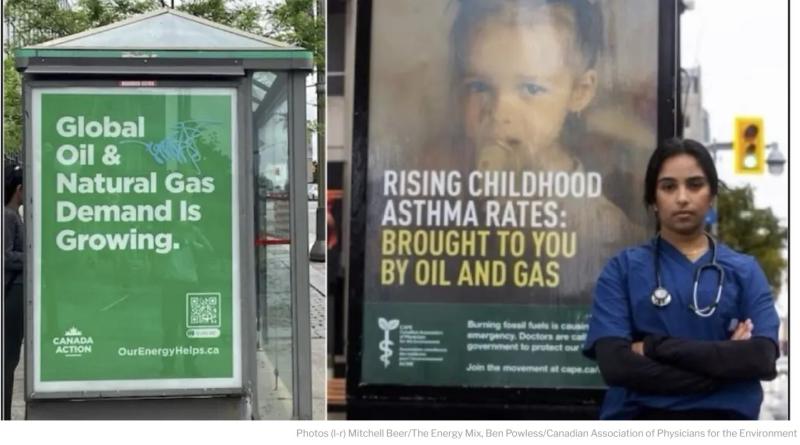Gas Industry Front Group Keeps Pitching LNG after Standards Body’s Greenwash Ruling Waits 3 Months

A fight over false fossil fuel advertising is playing out on Canada’s city streets, with the ad industry’s self-regulatory body under fire for taking 3½ months to notify a fossil-funded advocacy group that its messaging amounts to greenwashing.
Ad Standards, an industry self-regulatory body that evaluates ads and ensures compliance with the Canadian Code of Advertising Standards, ruled unanimously January 30 that Canada Action had violated sections of its code of conduct requiring accuracy, clarity, and responsible use of professional or scientific claims. But the self-styled grassroot group, which has received significant fossil fuel industry funding, continued to run ads claiming that liquefied natural gas (LNG) “will reduce global emissions”—partly because it didn’t receive notice of the ad council’s ruling until earlier this month.
“In fact, the advertiser and complainants were only informed of the decision on May 7,” Council President and CEO Catherine Bate said in a tersely-worded statement emailed to news outlets that had reported on the ruling, including The Energy Mix.
“The advertiser then responded with a request for an appeal, as is their right, within the required time frame. Complainants were similarly informed of Council’s decision and then of the appeal request.”
Three Months for a ‘Simple Email’
News of the long delay touched off a round of scathing criticism from the Canadian Association of Physicians for the Environment (CAPE), which received an anonymous leak of the Ad Standards decision and published it this week. The doctors first launched their campaign to ban fossil fuel advertising in 2022.
“The fact that it apparently took three months for Ad Standards to send a simple email to Canada Action about their ruling—which meant these pro-fossil-fuel ads continued to misinform people in Canada for months after they were found to be in contravention of multiple advertising standards—tells us how inadequate Canada’s regulatory system is for dealing with greenwashing,” CAPE President and Vancouver family physician Melissa Lem told The Mix in an email.
“As for Canada Action, they knew their ads were under investigation in January, yet still continued to buy up ad space to push a message they knew might be ruled as inaccurate and misleading. They also continued to post pro-B.C.-LNG statements on their website that repeated and advertised these claims after May 7, despite the ruling.”
Reviews of Ad Standards rulings are supposed to be conditional on an advertiser taking down its disputed ads while an appeal is under way. Citing the confidentiality of the Ad Standards process, Communications Lead Jessica Yared declined to answer The Mix’s question about whether the council had set that expectation. But a Canada Action ad was still in place on a downtown Ottawa bus shelter on the afternoon of May 28.
Bate’s statement acknowledged the delayed response to Canada Action, explaining that “the complaints process takes some time, and decisions are not published right away; no decisions are published until the appeal process has run its course. Unfortunately, due to staffing shortages and a significant surge in complaints, Ad Standards has been experiencing a backlog. We are working diligently to rectify this situation.”
Yared acknowledged that “the time it took us to be able to issue the decision to the advertiser is not ideal, and that is why we are already taking steps to close this gap.”
‘Textbook Greenwashing’
In her statement, Bate said the leaked decision was not final and took aim at what she termed the “egregious violations of confidentiality” in the case. Given that turn of events, “we will only be advising the advertiser of the outcome of the appeal. We will not be able to report the results of that decision publicly, or to comment further.”
CAPE campaigner Leah Temper told The Mix in an email that Ad Standards has already failed to published case histories since 2021, and last updated its green claims guide in 2007.
It’s against that self-regulatory backdrop that Canadian health organizations like CAPE have been advocating for the tobacco-style ban on fossil fuel advertising to protect public health, asserting that fossil fuel companies’ representation of their industry’s harms mirrors the misleading tactics previously used by tobacco companies.
“These ads are textbook cases of greenwashing, right down to the colour of the ads,” Lem said.
Tara Marsden/Naxginkw, Wilp Sustainability Director for the Gitanyow Hereditary Chiefs, said the need to combat the disinformation sown by such ad campaigns is made ever more urgent by wildfires that have displaced thousands of people from their homes already this year.
“The Gitanyow Hereditary Chiefs are grateful for the growing voices demanding truth and accountability in Canadian fossil fuel ads,” Marsden/Naxginkw said. “These misleading campaigns not only threaten climate action but also pose serious risks to public health and the environment.”
Canada Action describes itself as a grassroots organization that “combats misinformation” and campaigns on behalf of Canada’s natural resource industries—namely, oil, mining, natural gas, forestry, and renewables. Previous reporting by The Narwhal has shown “deep ties” to the federal Conservative Party and the oil and gas industry, and the organization has received funding from oil and gas companies.
Canada Action is responsible for a campaign that included advertisements stating that “B.C. LNG WILL REDUCE GLOBAL EMISSIONS,” with the lettering superimposed on a green background. The claim appeared in a transit ad and a newspaper version, which also included sub-texts.
Several Infractions, Unanimous Decision
Following complaints, the LNG ads were reviewed by Ad Standards, which reached a unanimous decision about Canada Action’s messaging on January 30, 2024. The council found several infractions that violated the Code’s clauses 1 and 8, which deal with accuracy and clarity and with professional or scientific claims.
In what it now styles as a preliminary decision, Ad Standards determined that Canada Action did not provide sufficient evidence to support its claim that B.C. LNG will reduce global emissions. The evidence the organization supplied to Ad Standards—and notably, not via the ad itself—indicated the claim is true “if only taking into consideration the off setting [sic] of transitioning from coal to gas.”
The claim was therefore found to have “distorted the true meaning of statements made by professionals or scientific authorities,” “promised a verified result without competent and reliable evidence” and created an “overall misleading impression… that B.C. LNG is good for the environment, amounting to greenwashing.”
Members of the council also raised concerns about the ad’s bright green background “that was used to emphasize an environmental benefit that liquefied natural gas does not truly have.”
Though the ruling was issued months ago, the ads have continued to appear on billboards, radio, public transit, and in major newspapers, CAPE says.
Ad Standards does not have regulatory power to take punitive actions, but can contact advertisers with requests to comply or make public declarations that the advertiser has breached the code. Ad Standards can also notify the Competition Bureau of an advertiser’s infractions and failure to comply with the council’s decision. The Bureau has been reviewing a separate CAPE complaint against the gas industry since October, 2022.





